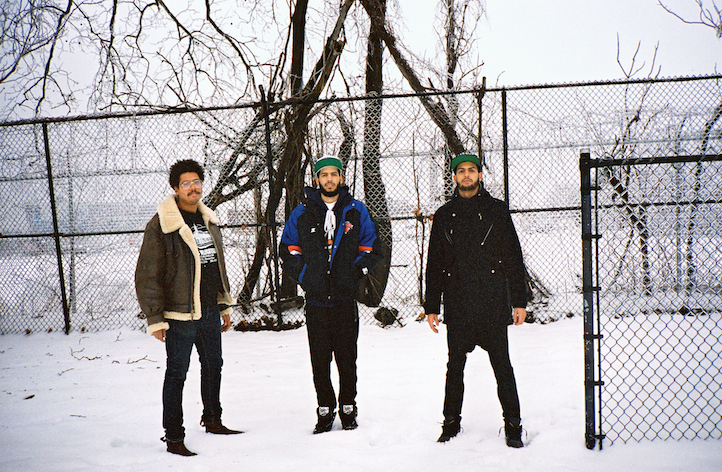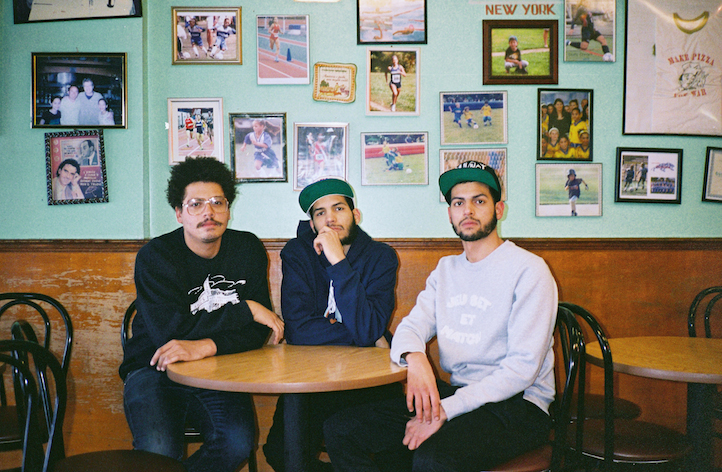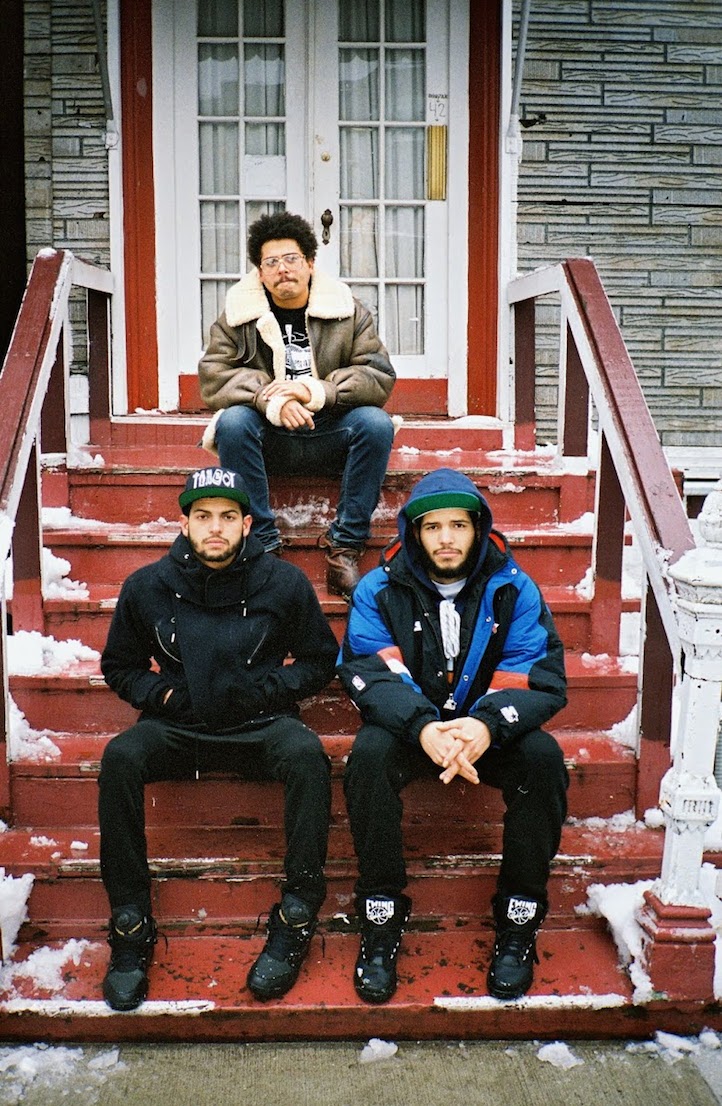Tuskegee Music: A “Minority” Movement in Dance Music
08.01.2014
MUSIC

“Tuskegee is not about race, it is about heritage: the concept being born out of the realization that Seth [Troxler] and The [Martinez] Bros shared very similar backgrounds and taste, despite being raised in different places and from different ethnic backgrounds,” reads the mission statement behind the new dance music label, Tuskegee. Race is one of those taboo discussions that is usually only welcomed if it’s written in the form of a joke (think Chris D’Elia or Kevin Hart) or behind closed doors. Admirably, DJ-producers Seth Troxler and The Martinez Brothers are bringing race as a topic of discussion into the dance music world by way of their Tuskegee label. The label is named after the Tuskegee Airmen – a group of Black World War II squadrons of airmen. Much like the airmen who broke down racial stereotypes by way of their acute skills and courageous acts, the founders and artists signed to the Tuskegee label strive to channel that brave mindset by experimenting with music that shifts the perception of being a talented, minority American.
Why ignore the elephant in the room? It’s not about pulling the “race card,” rather, it’s about appreciating your heritage outside of the confines of rap and into the world of dance music. It’s alarming that most of the new generation is largely unaware of the history of house and techno. I was first introduced to dance music as a toddler through my father. While living in Germany, he deejayed with vinyl at various parties – some of which I would accompany him to. He inculcated in me the value of not just dance music – but good music, solid composition, and how to recognize a well-produced record. The most important lesson I obtained from his storage of wisdom was the significance of ‘knowing where you’ve been to know where you’re going’ when it comes to music – particularly electronic based genres.
If you’ve ever been “that” Black kid at the DJ set – or any one that’s different from the masses for that matter – this interview is for you. Here, Seth and The Martinez Brothers elaborate on being minorities in the dance music industry and how that among other ideas inspired the creation of Tuskegee.
Life + Times: Let’s start with a couple of ignorant questions that someone is bound to ask or wonder. Gents, are you playing the “race card”?
Seth Troxler: Obviously not. We’ve overcome that view of race. Tuskegee is about embracing cultural differences influenced by background. We’re all different in many ways, yet we’re the same as a species. The more I’ve traveled, the more similarities I saw – we enjoy the same things, have the same dreams and goals. Yet I found people of ethnicity and poverty had so much to overcome in terms of equal opportunity and general prejudice. With blatant phobias toward Islam, anti- immigration reform and private prejudice, we can’t help but see that race is still a great topic of our time and we have a ways to go to overcome that. I think by shining light on the achievements of minorities, and not promoting the negative imagery promoted by media and pop radio of those cultures then it helps bring us all closer together.
L+T: Will Tuskegee only sign Black and Hispanic artists? What type of artists will you sign?
ST: Our focus is to sign people of minority. Our first releases will feature music from William Kouam Djoko – a Ghanaian living in Amsterdam. Harvard Bass who is Mexican-American, Bas Ibellini, as well as The Martinez Brothers and myself. There is a connection between the polyrhythmic backbone in all their cultural backgrounds, which has had an influence on their music composition. Tuskegee is a platform to display this connection.

L+T: When was Tuskegee conceptualized? Has this project been in discussion for months or years?
ST: I had been thinking for years that Tuskegee would be a fresh house music name, deep hitting old Chicago stuff. Then thinking of the world and speaking with the Bros how it’s funny there are so few minorities doing house any more. Considering the origins of house, it’s sad that there was no longer many people from our shared background interested in house. And it would be great to create a platform where we could promote that diversity in electronic music again.
The Martinez Brothers: This project has been in the talks for the last year and a half and a lot of the ideas were, funnily enough, conceptualized at after-parties. The first time Seth actually approached us with the name was at an after-party for BPM in 2013; and the rest of that year was devoted to brainstorming and getting [a] concept together. Amazing the ideas you can come up with while you’re out raving.
L+T: What were your introductions into dance music?
TMB: Dance music was introduced to us first by our father who was a big disco, paradise garage and loft head. I remember when Virgin Megastore in Times Square was still around and it was open 24 hours. Sometimes in the middle of the night, we would take a trip to the city and just go crazy buying different jazz, disco and house compilations. Those were great times discovering music with our pops. It was the way we bonded.
L+T: Be honest – were you always aware of the origins of house?
ST: Yes. My mother and father are both old house heads. I started listening to mix tapes in my parent’s car that they would get from Chicago and Detroit. I was born in Kalamazoo, MI and moved to Detroit when I was 13. At this point, I met some kids and went to a rave in the city. I knew this music was for me from then on. The positivity of the culture really changed my life and gave me the opportunities I have today.
TMB: Honestly growing up with our Dad, it was kind of hard not to pick up and learn about where this music came from, just because it was [a] constant conversation between us. Before dance music came into the picture, we were into the origins of modern music as a whole. We grew up listening and absorbing things like John Coltrane and Miles Davis or the Fania All-Stars; while our friends were busy worried about P. Diddy or JAY Z‘s newest single. So yeah, we’ve kind of always been heavy researchers of music in general, not just dance, house music.
L+T: Have you ever at some point in your career been self-conscious of your race whether it was as a concert goer or a performing artist?
ST: Yes, but by “self-conscious,” I don’t mean in a negative, ashamed way – just in a cognizant [or] aware sense. I.e. being the only brown person at the show and subsequent “spokesperson” of all minorities. I grew up in the suburbs, then moved to Berlin. Being one of the only brown persons for half my life, I’ve always been conscious of that because, it’s undeniable. However early in my life I realized that I didn’t want to be defined as the token minority, and rather myself. I’m Seth – only this.
TMB: We’re minorities of the world, but we are also definitely minorities of the scene, especially being Puerto Rican. But we’ve only ever looked at it as an advantage. It automatically makes us different and different is always cooler. We also approach dance music in a different way, which is always good in this day and age where everyone is just trying to do the same thing that others are doing. We always try to bring part of our heritage into our music, be it making tracks or deejaying.
L+T: Seth, I saw your Visionquest set at Mysteryland. You seem very confident in who you are as an individual and an artist. What do you attribute to your confidence?
ST: I think trying to overcome the stereotypical image of the Urban American, made me really focus on being me and being confidant about that. My parents always supported me to be myself, to love who I am. If you eliminate fear of self and realize you can do anything. There is this amazing book called A New Earth by Eckhart Tolle. It really helped me realize more about self-actualization which helps.
L+T: What are the ways in which growing up in Detroit and NYC has helped shape your core values as artists?
ST: Detroit is a deep city. It’s a hard place, segregated by race and class. The outcome of that has made a city whose outlet was the arts. Abstraction, soul and depth are words you could use to describe Detroit music and my music. Pushing boundaries.
TMB: I don’t think we would be doing this interview if we didn’t grow up in NYC. The guys that we learned from, Dennis Ferrer, Timmy Regisford, Masters At Work, whether they know it or not, gave us the blueprint of what this music and lifestyle were all about; and us being the youngest cats around these legends, we were just soaking it all in. We were going to Club Shelter whenever we had the chance to just stand in the booth and watch Timmy play for 12 hours and study not just the way he played, but what he played – which was everything from Robert Hood to Fela Kuti. Not just the clubs, but also the hustle mentality of NYC is what gave and continues to give us that drive to succeed as artists.
L+T: How are these values manifest in the inner workings of Tuskegee? Also, what are you looking to ultimately achieve through the label?
ST: We want to put a spin on what’s out there right now, bring some funk back into the game. Abstraction.
TMB: Us and Seth are really alike when it comes to the hustle, so it really works with us. There’s always new ideas flowing, we’re always trying to come up with different ways to portray our vision, which is ultimately just to showcase our heritage, culture, music and lifestyle.
L+T: For a Generation Y music listener that’s all about the current culture of “EDM” versus its roots — how would you explain the significance of knowing the history?
ST: For one EDM, has nothing to do with house music. It’s like saying Motown and Britney Spears are the same genre. The bigger question is getting more people to recognize this. From that point we can start to move forward.
TMB: Well to be honest, a lot of these EDM’ers could care less about the roots or about the music itself. But I would tell the person that’s really into music, that they’d be surprised at what they found if they dig into the past. Music is all about revolutions. “Deep house” is not something that was invented in the last couple of years. It’s been around and has evolved from something that’s come from back then. Basically, you can’t see where we’re going if you don’t know where we’ve been.
L+T: Many people learn by listening versus reading. Give me a few record names from your rolodex of inspirations that someone can learn the origins of dance music from.
ST: I think a really good beginner’s guide would be to watch a few films – like “MAESTRO” and “Hi Tek Soul.” There you can find everything you need to start exploring this wonderful culture. Being from Detroit, Ken Collier was the man who started it all, Ron Hardy and Frankie Knuckles in Chicago, Larry Levan [and] Body and Soul collective. These are the origins of our music. This is what we have evolved from.
TMB: That’s tough because the origins and inspirations spread really wide. You have to listen to everything from Giorgio Moroder “Evolution” and Kraftwerk “Numbers” and hit Philadelphia and listen to MFSB (Mother Father Sister Brother) “Mysteries of the World” and the Salsoul [Records] stuff. You can also see origins of dance music in rock, bands like The Clash were really big in the club with tracks like “Magnificent Seven.” We could go on and on.

L+T: Side note question – Is a DJ a musician?
TMB: Absolutely. I think the definition of a musician has probably changed in today’s day compared to back then. There are many producers these days that don’t pick up an instrument, but still have that certain musical instinct to be able to create on the spot. The DJ is no different. There’s still a certain musical creative process that goes on, and you need to have that creative musical instinct to be able to create and keep a vibe for a group of people for hours on end.
You can catch Tuskegee in action at HARD Summer this Saturday and Governor’s Island on Sunday of this weekend!





